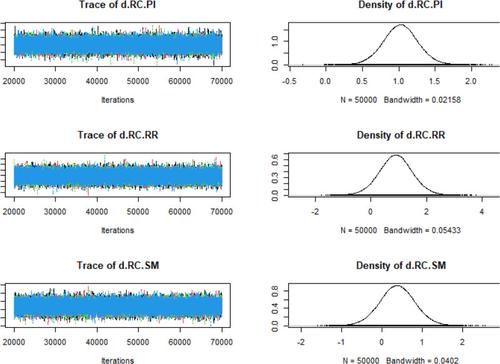当前位置:
X-MOL 学术
›
Clin. Psychol. Rev.
›
论文详情
Our official English website, www.x-mol.net, welcomes your feedback! (Note: you will need to create a separate account there.)
Effects of interventions for enhancing resilience in cancer patients: A systematic review and network meta-analysis
Clinical Psychology Review ( IF 12.8 ) Pub Date : 2024-01-12 , DOI: 10.1016/j.cpr.2024.102381 Xiaotong Ding , Fang Zhao , Qing Wang , Mingyue Zhu , Houming Kan , Enfeng Fu , Shuaifang Wei , Zheng Li
Clinical Psychology Review ( IF 12.8 ) Pub Date : 2024-01-12 , DOI: 10.1016/j.cpr.2024.102381 Xiaotong Ding , Fang Zhao , Qing Wang , Mingyue Zhu , Houming Kan , Enfeng Fu , Shuaifang Wei , Zheng Li

|
Various interventions appear to enhance cancer patients' resilience. However, the best intervention options are still unknown. This systematic review and network meta-analysis aimed to examine the impact of different interventions on resilience and identify the most effective interventions. Nine major English and Chinese databases were systematically retrieved for randomized controlled trials (RCTs) published from inception to 13 November 2023. The outcome was resilience. The analysis was conducted using Software Review Manager 5.4, R 4.2.3, and STATA 14.0. The network meta-analysis included 32 RCTs and evaluated 12 interventions. Regarding effectiveness, compared to routine care, the relative effect sizes of attention and interpretation therapy, cyclic adjustment training, cognitive intervention, expressive therapy, positive psychological intervention, social support intervention, and work-environment therapy had statistically significant enhancing resilience, with the SMD (95%CI) of 1.42 (0.75, 2.07), 1.97 (0.76, 3.18), 1.26 (0.76, 1.77), 0.93 (0.08, 1.78), 1.02 (0.55, 1.50), 1.01 (0.48, 1.56), 1.65 (0.94, 2.37), respectively. Considering the rank probability, statistical power, and efficacy, the most effective interventions for improving resilience were attention and interpretation therapy, cognitive intervention, and positive psychological intervention. With the limited quantity of RCTs, the effectiveness of cyclic adjustment training and work-environment therapy still needs to be explored. Attention and interpretation therapy was the first best choice for boosting resilience out of the 12 interventions. Cognitive intervention and positive psychological intervention were also better choices for improving cancer patients' resilience. Due to the low quality and quantity of included RCTs, the need for multi-center, higher-quality trials with larger samples should be carried out.
中文翻译:

增强癌症患者复原力的干预措施的效果:系统评价和网络荟萃分析
各种干预措施似乎可以增强癌症患者的恢复能力。然而,最佳干预方案仍然未知。这项系统回顾和网络荟萃分析旨在研究不同干预措施对复原力的影响并确定最有效的干预措施。系统检索了九个主要英文和中文数据库,用于从开始到 2023 年 11 月 13 日发表的随机对照试验 (RCT)。结果是复原力。使用 Software Review Manager 5.4、R 4.2.3 和 STATA 14.0 进行分析。网络荟萃分析包括 32 项随机对照试验并评估了 12 项干预措施。在有效性方面,与常规护理相比,注意和解释疗法、周期调整训练、认知干预、表达疗法、积极心理干预、社会支持干预和工作环境疗法的相对效应大小在统计学上显着增强了心理弹性,SMD (95%CI) 为 1.42 (0.75, 2.07)、1.97 (0.76, 3.18)、1.26 (0.76, 1.77)、0.93 (0.08, 1.78)、1.02 (0.55, 1.50)、1.01 (0.48, 1.56)、1.65 (分别为 0.94、2.37)。考虑到排名概率、统计功效和功效,提高心理弹性的最有效干预措施是注意力和解释疗法、认知干预和积极心理干预。由于随机对照试验数量有限,周期性调整训练和工作环境疗法的有效性仍需探索。在 12 种干预措施中,注意力和解释疗法是增强复原力的首选。认知干预和积极心理干预也是提高癌症患者心理弹性的较好选择。由于纳入的RCT质量和数量较低,需要开展多中心、更大样本、更高质量的试验。
更新日期:2024-01-12
中文翻译:

增强癌症患者复原力的干预措施的效果:系统评价和网络荟萃分析
各种干预措施似乎可以增强癌症患者的恢复能力。然而,最佳干预方案仍然未知。这项系统回顾和网络荟萃分析旨在研究不同干预措施对复原力的影响并确定最有效的干预措施。系统检索了九个主要英文和中文数据库,用于从开始到 2023 年 11 月 13 日发表的随机对照试验 (RCT)。结果是复原力。使用 Software Review Manager 5.4、R 4.2.3 和 STATA 14.0 进行分析。网络荟萃分析包括 32 项随机对照试验并评估了 12 项干预措施。在有效性方面,与常规护理相比,注意和解释疗法、周期调整训练、认知干预、表达疗法、积极心理干预、社会支持干预和工作环境疗法的相对效应大小在统计学上显着增强了心理弹性,SMD (95%CI) 为 1.42 (0.75, 2.07)、1.97 (0.76, 3.18)、1.26 (0.76, 1.77)、0.93 (0.08, 1.78)、1.02 (0.55, 1.50)、1.01 (0.48, 1.56)、1.65 (分别为 0.94、2.37)。考虑到排名概率、统计功效和功效,提高心理弹性的最有效干预措施是注意力和解释疗法、认知干预和积极心理干预。由于随机对照试验数量有限,周期性调整训练和工作环境疗法的有效性仍需探索。在 12 种干预措施中,注意力和解释疗法是增强复原力的首选。认知干预和积极心理干预也是提高癌症患者心理弹性的较好选择。由于纳入的RCT质量和数量较低,需要开展多中心、更大样本、更高质量的试验。



























 京公网安备 11010802027423号
京公网安备 11010802027423号